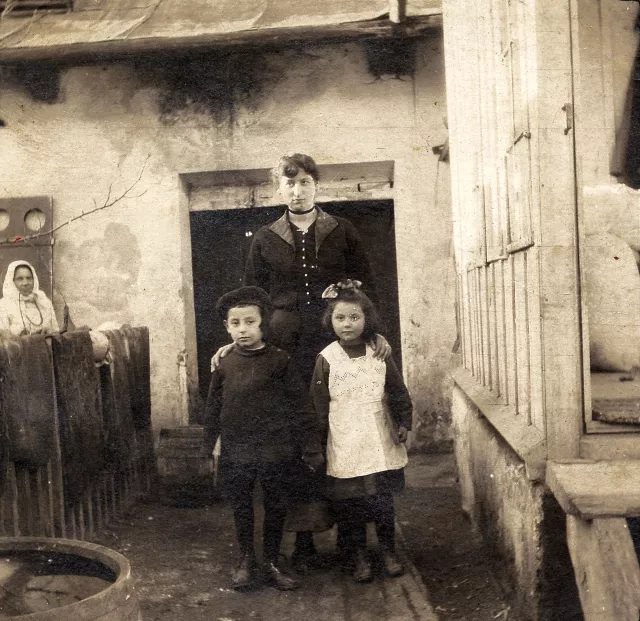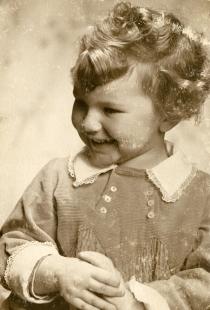This picture was taken outside our house in Lagiewniki during the festival of Pesach. My paternal grandfather, Ozjasz Grossbart, was a devout and wealthy Jew, so he invited the invalid Austrian Jewish soldiers from the nearby convent to spend the holidays with him. During the war there was a hospital in that convent run by the nuns. This picture was taken by one of the soldiers. My brother Jehuda is standing next to me. You can see that there was something wrong with his leg. My mother Ester (Hadasa) is standing behind us.
I don't know whether my great-grandfather built that house in Lagiewniki or bought it. What I do know is I was born there, but I was 5 years old when we moved away from there. But maybe he did build it, because that house was wisely designed, and the outbuildings were in a square. The house fronted onto the street - like so. A very decent house, stone. When you went in off the street, first there was this porch - we didn't call it a hallway, we didn't call it a hall. Straight in front of you was a shop. Not an inn, so much, but an off-license, you couldn't drink in the shop. It sold beer and wine, that I remember - I remember these barrels and kegs standing there, probably for a wedding somewhere or something. Maybe they sold vodka there too. I think some man worked there. Perhaps an assistant hired by Grandfather. Next to the entrance to the shop was a pantry where there was a big cupboard.
From the porch, off to the right you went into a huge dining room. The dining room window looked out onto the street. Right beyond that was Grandfather's room, there he had his cashbox, his desk - today we'd call it an office. It was a nice room, furnished - masculine; Grandfather slept there. Then there was the parlor. That was a beautiful, very big room, several windows onto both sides - the front and the yard. And in that room, in the parlor, Grandmother slept, she had her own door out into the yard. From the parlor there was a passage to my parents' room, and then there was another, smaller room, Aunt Ela's. I lived [slept] in with Aunt Ela, and my brother Jehuda with my parents. And there was also this glassed-in verandah, that was where we played when my cousins came. The Wieners, for instance, from Cracow. The verandah gave out onto the yard. Yes, we played there in the winter, and if the weather was bad in the summer, we didn't play outside, but on the verandah.
In front of the house, from the street side, was a large summerhouse. Yes. And parallel to the house was a stable. We called it a stable, but there weren't any horses there, just a trap, because my father's sisters used to ride to town, to Podgorze to school. Next to that was the drying house where the hides were dried. And at right angles was this outhouse. Further on was the wash house, and in it a bath and everything needed for the washing. A barrel stood underneath the guttering to collect rainwater for the washing. The washerwoman came once a week. There was a cellar too, where there was an ice-house - part of the cellars were clad in ice. In the winter ice would be brought from the Wilga so they could keep it cool in the summer. The Jews eat kosher meat, and so when they killed a calf they had to have ice to keep the meat fresh.
As Grandfather was a wealthy man he had a brick booth [sukkah]. It was incorporated into the building of the house. It had a hinged roof that they could raise and lay branches on top. And only Father and Grandfather ate their dinner there at the holidays. Yes. Just the men.
The farmyard was square shaped. There was a garden there, and in the center a very pleasant little summerhouse with a swing that Grandfather had made for his grandchildren. My father was his only son, so his children were the apple of his eye, of course. In the garden there were flowers and fruit trees. There were peaches growing up against the wall of the house, a south-facing one. No-one was allowed to touch, only Grandfather himself picked them. He would gather them into this sieve, and then I remember that my mother pricked them, I don't know what for - so that the juice would come out or what - and made jam with them. There were sour cherries and apples in the garden, there were blackcurrants that my brother and I picked - that was allowed, but not the peaches.
My brother's name was Jehuda. He was two years older than me. I was born in 1911, so he was born in 1909. Apparently he was born dead - I only know this from being told - and the midwife threw him up in the air or something - suffice it to say that he was lame after that. That one leg didn't develop properly.
I was born on 30th July 1911 in Cracow, in Grandfather's house in Lagiewniki. It is our custom, the Jewish custom, to name girls after their grandmothers, and there were two of us Emilias. The other one, my cousin, was Mila, because she was older, and I was Milusia [two diminutive forms, the latter used for younger children]. And later on, at school, 'Milusia' became 'Misia.'
Father worked, Grandfather worked, Mother looked after her little boy, and I spent most of my time with Grandma and Aunt Ela, because I wasn't at school yet. Mother spent more time looking after him than me - obviously, the only son. I was healthy, I ran around, charged around, and played. I was into everything. I was a very lively child.



















